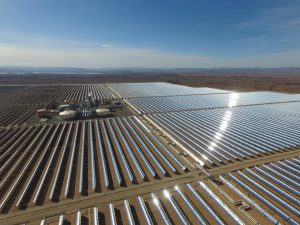Morocco aims to have renewable energy constitute 42% of its energy production by the end of 2020.

Morocco remains a leader in the Arab world in terms of electricity from renewable energy, a study from the King Abdullah Center for Petroleum Studies and Research has found.
The study reveals Morocco is the leader in generating electricity from renewable energy ahead of Egypt and Jordan.
The study indicates that the renewable energy sector needs a larger workforce and more resources for growth.
The sector only generates 1% of total job opportunities in Morocco, Egypt, and Jordan.
“Concentrated solar power (CSP) in Morocco, with 1,800 employees and solar PV in Egypt, with 3,000, are the renewable sectors that employ the greatest number of workers in those two countries, respectively,” the study said.
Resources providing electricity
The production of coal in Morocco represents a lever in the electricity sector. Coal dominates the country’s electricity generation capacity with 58% of power production in 2016. Coal is followed by natural gas with 20% and oil by 10%. Morocco styles itself as a continental leader in renewable energy with several world-renowned projects in the field, including the Noor Ouarzazate solar complex.
The study said that Solar and wind power (12%), and hydropower (1%) provided the remainder of the country’s electricity mix.
These figures are in line with recent estimates from the International Energy Agency (IEA), showing renewable energy could employ more than 40 million people by 2050.
The study shows that the sector still does not attract students, who put their focus more on fields such as social sciences and health and education, “reflecting their aspiration to work in government.”
The report shows that very few students study “ scientific, technical and engineering subjects – fields representing most jobs in the private and renewable energy sectors.”
The study, however, highlighted Morocco’s determination to continue to grow as a leader in the continent and in the Arab world in the field of renewable energies.
“Morocco’s National Energy Strategy (NES) was one of the most ambitious and comprehensive renewable energy strategies in the MENA region,” the study said.
The report recalled Morocco’s aspirations to achieve 42% of total installed power generating capacity from solar, wind, and hydropower resources by 2020, with 2 gigawatts (GW) of installed capacity for each resource, or 6 GW overall.
Morocco’s targets will increase in the long term with an ambition of 52% by 2030.
Morocco’s Exchange Office shows that Morocco’s imports of electricity decreased by 93.5%, owing to the country’s determination to become self-sufficient producer of its own electricity.
In 2019, Morocco only imported electricity worth MAD 149 million (around €14 million) against MAD 2.3 billion (about €217 million).